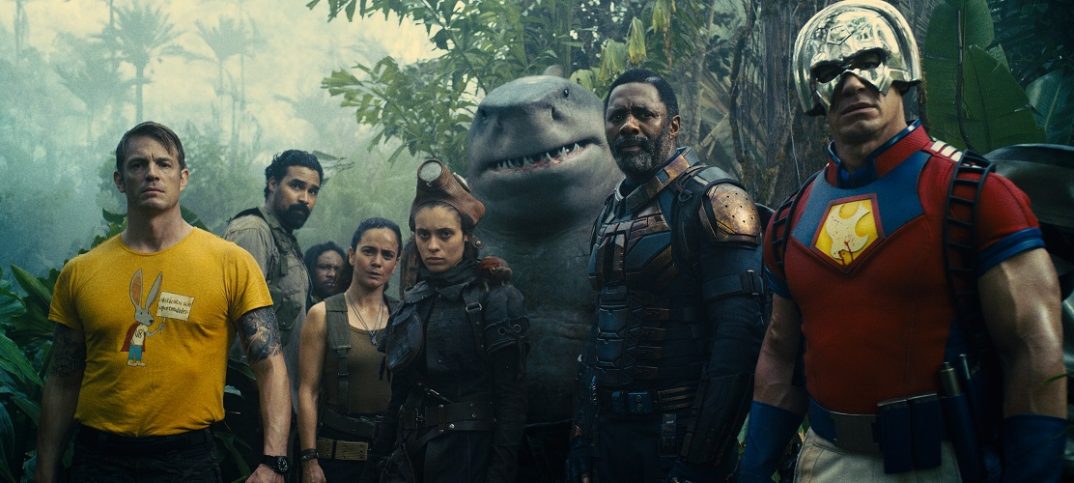Reviewed by Jeffrey Sanzel
Superhero movies don’t aim for high art. The goal is big box office sales. For the most part, they have never been awards fodder and rarely make best film lists. However, that doesn’t preclude examples of great craft, skill, and even insight. They are not revisionist art descending into the mire of pretension (yes, you, Green Knight) or thrillers aspiring to greater depth (don’t look away when I’m talking to you, Old). Historically, superhero movies strive for entertainment. And there is nothing wrong with that.
The Suicide Squad is the follow-up to Suicide Squad (2016), differentiated by losing its definite article. A sequel? A spinoff? A reboot? A relaunch? There are carryovers from the previous film, so it’s not a completely new entity. But, for whatever reasons, the recent incarnation is a vast improvement—funnier and smarter and far better paced. It is also R-rated, as opposed to the previous PG-13, which means this is a more violent, gorier outing.

There is plenty of plot centering around a group of villains given the opportunity to reduce their prison sentences by running covert missions for the United States government. Task Force X lands on a Southern American island nation, Coro Maltese, after a military insurrection puts the country in the hands of an anti-American faction. Task Force X—the titular Suicide Squad—is sent to destroy Project Starfish, a laboratory housed in a Nazi-era fortress, Jötunheim. The experiment is a giant alien starfish that the new regime will use against its enemies, most notably America.
The Task Force splits into two squads, with one unit almost completely eradicated in an ambush. Only its leader, Col. Rick Flag, and the mercurial Harley Quinn evade death. Bloodsport leads the surviving, joined by Peacemaker, King Shark, Polka-Dot Man, and Ratcatcher 2. They unite with rebel forces, led by Sol Soria, who agree to assist them. Added to the mix is the Thinker, the eccentric scientist who is running Project Starfish. Most of the action is the Suicide Squad invading the capital and laying siege to Jötunheim. Along the way, there is massive carnage, with bodies being shot, blown up, torn apart, and even eaten. This is not a Disney movie.
Perhaps not quite as irreverent as Deadpool, The Suicide Squad consistently amuses. While the humor is, for the most part, sophomoric, the jokes usually land. The writing is smart(ish) and the direction is brisk—both due to James Gunn’s clear vision. And he has assembled a first-rate cast that somehow makes it all worthwhile.
Idris Elba is terrific as Bloodsport, who reluctantly heads his team to help his daughter. His dry wit, spot-on delivery, and underlying humanity give dimension without losing the danger. John Cena’s Peacemaker is equal parts flag-waving psychotic and macho frat boy. The contrast of Elba’s self-aware Bloodsport and Cena’s almost oblivious Peacemaker create a wonderful contrast. Joel Kinnaman’s Rick Flag is less showy but brings both an aww-shucks integrity and wide-eyed understanding.
Sylvester Stallone voices the bizarre hybrid, man-eating King Shark, with just the right monosyllabic innocence. David Dastmalchian shows depth in the melancholy Polka-Dot Man, one of the more eccentric characters, and has the best line in the film. Daniela Melchior is the perfect millennial slacker-with-a-heart-of gold, Ratcatcher 2 (with an adorable CGI sidekick rodent, Sebastian). Peter Capaldi’s Thinker is an appropriately underplayed mad scientist, with just enough danger to avoid caricature.
And, of course, Margot Robbie’s third time as Harley Quinn is just as impulsive, amoral, and insane; it is a psychotic tour-de-force. But in this rogue’s gallery, Viola Davis’s Amanda Waller is the most cold-blooded. Davis, an exceptional chameleon of an actor, is chillingly methodical as the program leader.
What separates the focus on villains rather than superheroes is often the angst. Few characters are more brooding than Batman, and even Superman has found a darker side. What works so well in The Suicide Squad is that there is little indulgence or over-sentimentality. Genuine moments of compassion flash throughout, and they enrich the experience, but Gunn never dwells as he moves on to the next fight, explosion, and decapitation. He creates hyper-real environments.
Waller rules over the agency with an iron fist, but that doesn’t stop her subordinates from making side bets on who will survive the mission, a nod towards office pools. A screaming match between Bloodsport and his daughter is both over-the-top and recognizably domestic. Gunn’s world is the intersection of the extreme with honest threads of reality.
If you’re looking for art, look elsewhere. But if you’re looking for easy laughs, first-rate special effects, and a good—if extremely violent—escape, you could do worse than The Suicide Squad.
The film is now playing in local theaters and streaming on HBO Max.







